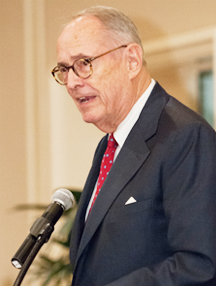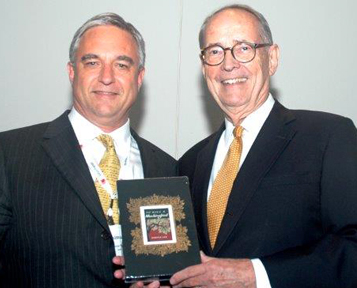© 2015 The Texas Lawbook.
By Talmage Boston of Winstead
(April 9) – Before serving as Attorney General of the United States under Presidents Ronald Reagan and George H.W. Bush, Dick Thornburgh began life in Pittsburgh. There, early in his childhood, he developed an abiding passion for baseball (in general) and the Pittsburgh Pirates (in particular).
There was a problem though. From the 1930’s through the 1950’s, the Pirates lost more games than any other team in the National League. Their dismal record over those years somehow didn’t matter to Dick. He still loved his hometown team, and never let his disappointment over their perennial second division finishes impact his sunny disposition.

Then unexpected tragedy reared its ugly head.
Dick and Ginny Thornburgh were a one-car family. Many weekday mornings, she would put the three young boys in the car and then drive Dick to work in downtown Pittsburgh, where he practiced as a young associate with the Kilpatrick law firm (which in fifty years would evolve into K&L Gates).
After dropping Dick off at his office on Friday, July 1, 1960, Ginny drove away. A few minutes later, her car veered across the road’s centerline, and collided head-on with a truck.
The crash killed Ginny instantly and caused permanent brain injury to the Thornburghs’ four-month old son Peter, who was catapulted into the dashboard (in the days before car seats).
Dick Thornburgh understandably spiraled into deep grief over the loss of his wife and injury to his infant son. Family, friends, and Kirkpatrick’s lawyers and staff reached out to the young lawyer in hopes of bringing him out of his sorrow.

As described in his autobiography, Where the Evidence Leads (University of Pittsburgh Press 2003), and as he has always acknowledged, those many loving arms definitely helped him recover from his traumatic loss, but another factor that aided in restoring Dick’s emotional equilibrium during the late summer/early fall of 1960 was the meteoric rise of his beloved Pittsburgh Pirates.
Under manager Danny Murtaugh, and led by emerging star Roberto Clemente and that season’s National League MVP Dick Groat and Cy Young Award winner Vernon Law, the Pirates in 1960 shocked the sports world and won the National League pennant. They then took on the mighty New York Yankees (led by legendary skipper Casey Stengel, and their cluster of superstars — Mickey Mantle, Roger Maris, Whitey Ford, and Yogi Berra) in the World Series and battled them to the end.
Dick attended Game Seven of the Series on October 13, 1960, at Forbes Field in Pittsburgh.
With the score tied 9-9 going into the bottom of the ninth, second baseman Bill Mazeroski led off by knocking a walk-off home run over the left field wall to win the Series for the Pirates – a play regarded by baseball historians as one of the most dramatic moments in the history of the Fall Classic.
Ecstatic pandemonium reigned throughout Pittsburgh. David had slain Goliath. Joy, at last, had arrived in Mudville.
Upon the Pirates’ winning the World Series, Dick Thornburgh began believing in miracles.
If his chronically underperforming Pittsburgh Pirates could rise up and win the World Series over the mighty Bronx Bombers, then, by golly, anything was possible; and soon the bounce returned to Dick’s step, a smile reappeared on his face, and his dynamic personality resurfaced after months of being submerged.
Armed again with his trademark high-beam optimism, Dick soon found a new soul-mate to love in the form of a smart, lovely, warm-hearted young woman named Ginny Judson, and they married in late 1963. Since then, Dick and his second Ginny have thrived with their family of children, grandchildren, and now great-grandchildren for over a half-century.
Among his professional achievements since coming back from the tragedy, Dick served with distinction as U.S. Attorney for the Western District of Pennsylvania (1967-1975); Assistant Attorney General for the U.S. Justice Department’s Criminal Division (1975-1978); Governor of Pennsylvania (1979-1987); Attorney General of the United States (August 1988-August 1991); Under-Secretary General of the United Nations (1992-1993); court-appointed examiner in the WorldCom bankruptcy proceedings (in 2002); and lead investigator of the controversy involving the reporting of George W. Bush’s service in the Air National Guard which led to the resignation of Dan Rather at CBS (in 2004).
In the spring of 2005, shortly after “Rathergate,” Dick Thornburgh served as the keynote speaker at a CLE conference in Arizona organized by the PWC national accounting firm which I attended, and he delivered a stirring speech on the topic, “Preserving the Integrity of Important Institutions,” during the seminar’s first afternoon.
At a seated dinner that evening, Dick and I met for the first time. Upon our being introduced, Ginny recognized my name and reminded Dick that she had just given him my first book, 1939: Baseball’s Tipping Point (Bright Sky Press 2005) as a birthday present.
The baseball passions of two seasoned lawyers aligned in a nanosecond, and since then, our friendship has synchronized into a shared affection for both our National Pastime and the legal profession.
The great times we have experienced together since that first meeting include the following:
• At my invitation, in the summer of 2005, Dick came to Dallas and gave to the Dallas Bar Association’s Business Litigation Section the same “Preserving Institutional Integrity” speech he had delivered at the PWC conference. The next day, he addressed the members of the World Affairs Council of D/FW. On the night between his two presentations, I arranged for him to throw out the first pitch at the Rangers-Twins game in Arlington, and we watched the ballgame together that evening in a suite filled with Dallas lawyers.
• At the 2006 All-Star Game in Pittsburgh, Dick hosted me and my wife Claire for an intimate luncheon at the historic Duquesne Club, where we shared baseball stories with Dale Petroskey (then the President of the National Baseball Hall of Fame, now the President/CEO of the Greater Dallas Regional Chamber), Sharon Robinson (daughter of the great Jackie Robinson), and Jackie Autry (widow of former Los Angeles Angels’ owner and cowboy movie star Gene Autry).
• One morning in early 2010, in helping plan the programs for that summer’s State Bar of Texas Annual Meeting, in the context of celebrating the 50-year anniversary of the publication of To Kill a Mockingbird, I started brainstorming a slate of speakers who could address a variety of perspectives on Atticus Finch as the legal profession’s ultimate role model. Upon telling Claire my idea, she reminded me that we already knew a real life Atticus Finch who would be a great addition to our program — and his name was Dick Thornburgh. In June 2010, Dick came to Fort Worth and spoke at the Annual Meeting on how his career has been influenced by Harper Lee’s protagonist. Later that year, inspired by the speeches we had given at the convention, Dick and I each authored a column for The National Law Journal which recognized the impact of Atticus Finch on the profession.
• In the fall of 2011, Craig Enoch asked me to get Dick to come to Austin and serve as the keynote speaker for the Texas Supreme Court Historical Society’s Annual John Hemphill Dinner. Dick agreed, and as we visited in the Four Seasons’ bar before the banquet began, I told him of my book-in-progress which the State Bar planned to publish the following year, entitled Raising the Bar: The Crucial Role of the Lawyer in Society. Dick answered in the affirmative that night when I asked him to write my book’s foreword, making me the happiest guy in Austin.
• In April of 2013, I accepted Dick’s invitation and gave my series of ethics/professionalism speeches on Abraham Lincoln, Atticus Finch, Leon Jaworski, and James A. Baker III (based on chapters in my book) at programs co-sponsored by the University of Pittsburgh’s Dick Thornburgh Forum for Law and Public Policy and the University’s Law School.
In summary, a passion for baseball proved instrumental in Dick Thornburgh’s getting back on his feet after the July 1960 family tragedy.
The emotional turnaround inspired by his beloved Pittsburgh Pirates winning the World Series moved him down the road not only toward achieving major accomplishments throughout his historic career, but also in rebuilding his family life. On top of that, Dick’s and my making an instant common bond through our deep connection to baseball planted the seed for what has blossomed into a marvelous friendship of ten years (and counting), reaping benefits for both of us on a personal and professional level.
Recently, I had the privilege of meeting U.S. Supreme Court Justice Clarence Thomas. From reading his memoir My Grandfather’s Son (Harper 2007), I knew that when President George H.W. Bush nominated Thomas to serve on the Supreme Court in 1990, it led to his having positive dealings with then U.S. Attorney General Dick Thornburgh.
Upon shaking hands with the justice, I gave him a copy of Raising the Bar, and opened our conversation with: “Justice Thomas, you and I have a mutual friend in Dick Thornburgh. He wrote the foreword to my book.”
His eyes lit up. “That’s great! Dick’s one of my favorite people. How did you get to know him?”
“We met through baseball, and things just took off from there.”
Talmage Boston is a shareholder in the Dallas office of Winstead PC, and a Media Member of the Texas Baseball Hall of Fame.
© 2015 The Texas Lawbook. Content of The Texas Lawbook is controlled and protected by specific licensing agreements with our subscribers and under federal copyright laws. Any distribution of this content without the consent of The Texas Lawbook is prohibited.
If you see any inaccuracy in any article in The Texas Lawbook, please contact us. Our goal is content that is 100% true and accurate. Thank you.
